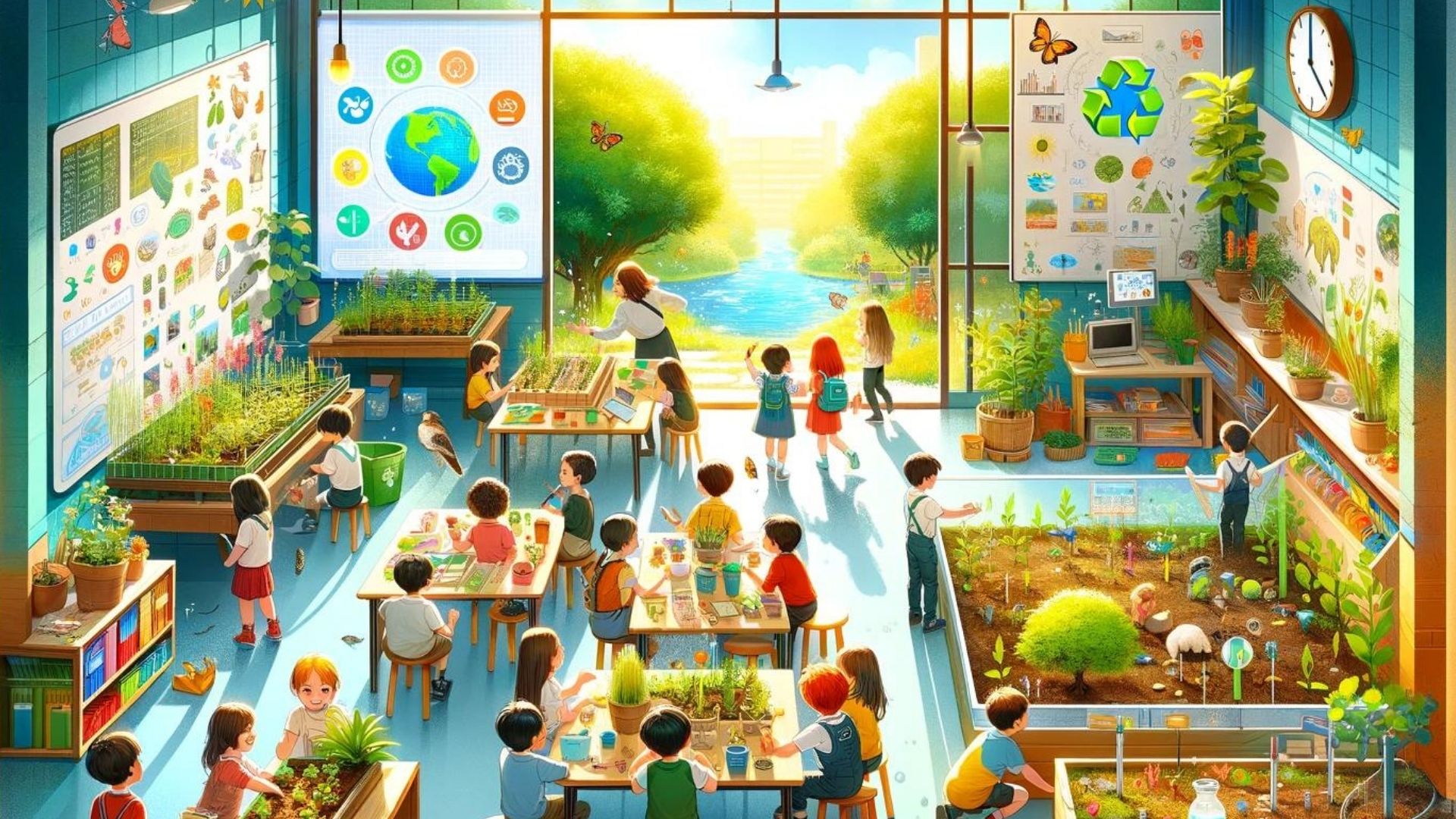- Article Audio
- The Challenge: Teaching About the Planet Isn’t Enough
- Case Studies: From Tiny Seeds to Big Impact
- Why It Works: Age Doesn’t Limit Impact
- Bringing Environmental Education to Your Community
- Why Should You Care?
- Key Takeaways
- Keywords with Definitions
- Frequently Asked Questions (FAQs)
- Myth Buster
- Let’s Talk!
Article Audio
[spreaker type=player resource=”episode_id=59085593″ width=”100%” height=”200px” theme=”dark” playlist=”false” playlist-continuous=”false” chapters-image=”true” episode-image-position=”left” hide-logo=”false” hide-likes=”false” hide-comments=”false” hide-sharing=”false” hide-download=”true”]The Challenge: Teaching About the Planet Isn’t Enough
We all know our planet faces serious environmental problems – climate change, pollution, resource depletion… the list goes on. But simply telling kids these facts can feel overwhelming, even scary. The key is inspiring action alongside knowledge!
That’s where these innovative primary schools come in. They’re demonstrating that fostering love for the environment and empowering young learners to make a difference starts with hands-on, creative approaches.
Case Studies: From Tiny Seeds to Big Impact
- The Schoolyard Habitat: Imagine a bustling campus transformed! Students design and plant pollinator gardens, attracting bees and butterflies. They build birdhouses, monitor a compost bin teeming with life… suddenly their schoolyard is a living science lab!
- Trash Detectives to Recycling Heroes: Kids become waste investigators, auditing their school’s trash and identifying areas for improvement. This turns into student-led recycling programs, classroom zero-waste challenges, and even presentations to local officials advocating for better recycling policies.
- Community Connection: The Ripple Effect Field trips to local farms teach kids where their food comes from. Partnering with conservation groups to restore a nearby stream sparks a passion for protecting local ecosystems. These experiences show students their actions have positive consequences far beyond the classroom.
Why It Works: Age Doesn’t Limit Impact
- Ownership and Agency: Student-led projects put kids in charge. This isn’t just following instructions, it’s about problem-solving and making real choices.
- Learning Beyond Facts: Measuring temperatures for a climate study, calculating their school’s waste – this reinforces math and science while tackling real-world issues.
- Emotional Connection is Key: Hands-in-the-dirt gardening or witnessing the return of wildlife to a restored habitat fosters a deep love and responsibility for nature.
- A Legacy of Action: Empowered young people grow into adults who carry those early experiences well beyond their school years.
Bringing Environmental Education to Your Community
Inspired by these examples? You can be a changemaker too!
- Support Local Educators: Are there similar initiatives at your child’s school? Volunteer time or donate resources to keep these efforts thriving.
- Start in Your Backyard: Creating a vegetable patch or setting up a rain barrel to conserve water are family-friendly ways to introduce environmental concepts at home.
- Advocate and Share: Ask your school board about their environmental education plans. Spread the word about successful programs to inspire others!
These primary schools demonstrate that environmental education isn’t just a subject; it’s a mindset of empowerment, a belief that even small actions can make a big difference. Together, we can raise a generation equipped and passionate about shaping a greener future for all.
Tell us: Are there awesome environmental initiatives happening in schools near you? Share your stories in the comments below!
Why Should You Care?
- Our Future Depends on It: Raising environmentally conscious children is key for addressing urgent issues like climate change and pollution.
- Early Action = Lifelong Impact: Habits and passions started young tend to endure, shaping the environmentally-minded leaders of tomorrow.
- Empowerment Over Fear: Hands-on environmental education builds hope and agency, not just anxiety about problems.
- It’s for Every Child: Environmental issues impact everyone, regardless of background. Inclusive education lays the groundwork for a just and sustainable future.
Key Takeaways
- Action-Oriented Learning Is Best: Simply knowing facts isn’t enough. Student-led projects lead to deeper engagement.
- It Connects to All Subjects: Environmental lessons can reinforce math, science, even art, creating a holistic understanding.
- Nature is the Best Classroom: Outdoor experiences cultivate a personal stake in caring for the environment.
- Community Matters: Projects with local impact show the power of collective action.
- Small Starts Lead to Big Change: Schools demonstrate you don’t need vast resources to make a difference.
Keywords with Definitions
- Environmental Education: Teaching about the environment and how human actions impact it, fostering problem-solving for a sustainable future.
- Primary School: Educational institution for young children, typically ages 5-11.
- Stewardship: Active responsibility for the care and well-being of something, in this case, the environment.
- Pollinator Garden: Planting flowers that attract bees, butterflies, and other insects crucial for a healthy ecosystem.
- Compost: Nutrient-rich soil created through the decomposition of organic materials like food scraps and yard waste.
- Zero-waste: Aiming to eliminate sending anything to landfill by reusing, recycling, and composting all possible materials.
- Ecosystem: A community of living and non-living things interacting within a particular environment.
- Conservation: Protecting natural resources and ecosystems for present and future generations.
- Agency: The ability to make choices and act independently to affect change.
- Rain barrel: A container collecting rainwater from roofs, reducing runoff and conserving water.
Frequently Asked Questions (FAQs)
What about schools with limited resources? Start small! A classroom compost bin, energy-saving campaign, or upcycling art projects are all impactful.
How do I find environmental education programs near me? Search online, contact local nature centers, parks, or environmental groups.
My child isn’t interested in nature. What can I do? Find a relatable angle: animal lovers, budding engineers (solar power!), or kids passionate about social justice.
Myth Buster
Myth: Environmentalism is all doom and gloom.
Reality: Effective environmental education emphasizes solutions, empowerment, and the beauty worth protecting!
Let’s Talk!
- Do you remember nature-focused activities from your childhood? How did they shape your outlook?
- What’s one change your family could make, big or small, to live more sustainably?
- How can businesses or community groups support environmental education in schools?
Share your thoughts in the comments below!












0 Comments